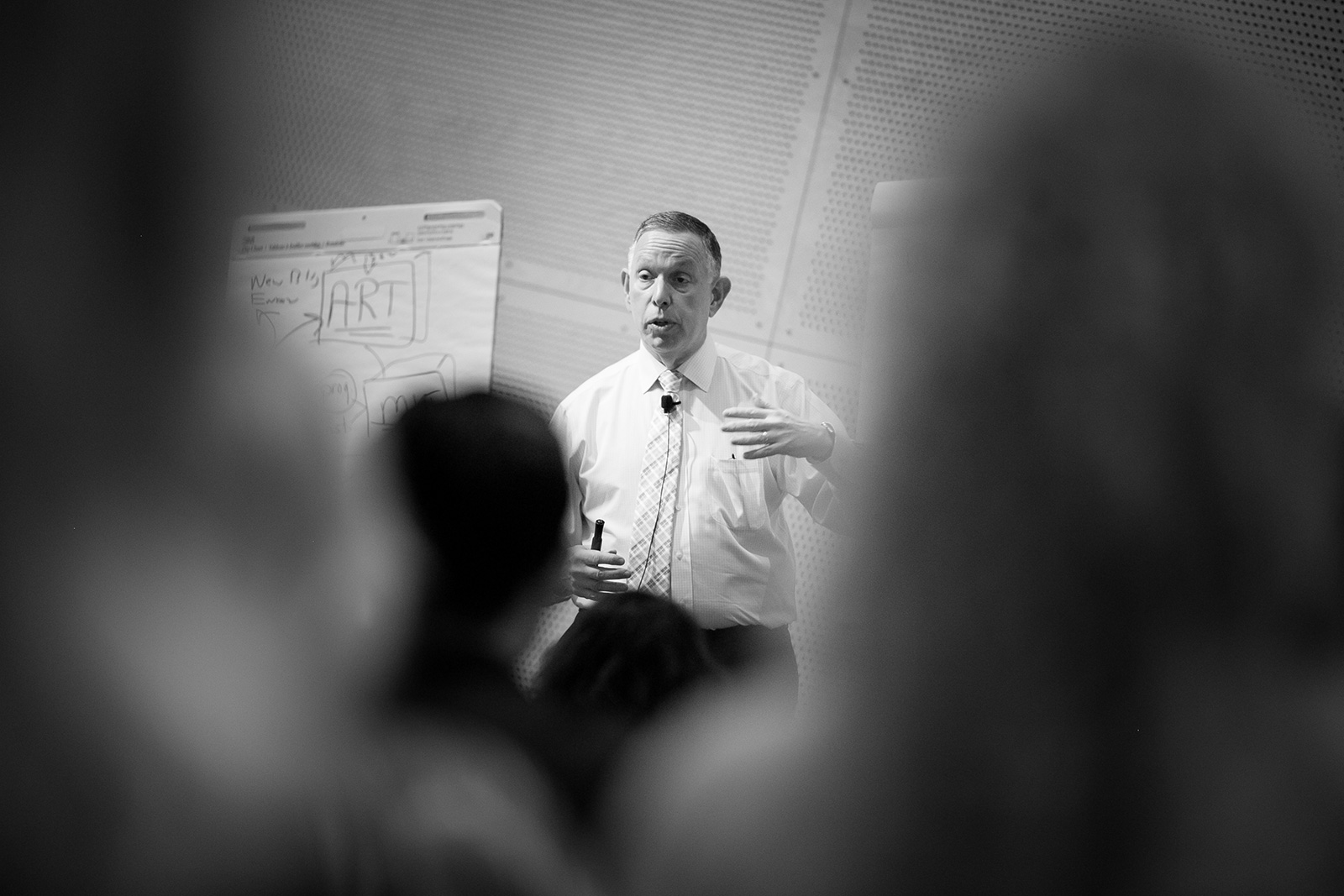Ten Years of Excellence: The DeVos Institute of Arts Management at UMD
October 09, 2024

The institute will no longer be housed at the University of Maryland, but its lasting impact endures, says Dean Stephanie Shonekan.
By Jessica Weiss ’05
At the start of her internship at the DeVos Institute of Arts Management at the University of Maryland in 2014, Amanda Ogorzalek ’13 was handed a binder packed with information on thousands of arts organizations from around the world—and tasked with organizing it.
She dove in eagerly. A recent graduate with degrees in theatre and communication, and with extensive performance experience, Ogorzalek wanted to understand the behind-the-scenes workings of arts organizations. Interning under some of the most respected arts administrators in the world—including the DeVos Institute Chairman Michael M. Kaiser, former president of the John F. Kennedy Center for the Performing Arts—she gained firsthand insight into the creativity and strategic thinking necessary to help arts organizations thrive.
“All of a sudden, I was exposed to this extremely streamlined and strategic way of looking at the performing arts, and it 100% set me on my path into arts management,” said Ogorzalek, who went on to work in administration for several arts organizations, including Broadway theater operators, producers and presenters. She now works at the Walt Disney Company in New York City. “I could not have asked for a more valuable introduction to the field.”
Since its founding nearly 25 years ago, the DeVos Institute has become the gold standard in arts management consulting, helping cultural organizations thrive and sustain their impact. Housed at the University of Maryland since 2014, the institute has reached thousands of individuals, organizations, governments and foundations with training, research and its signature arts management advising.
Though the formal partnership between the institute and the university ended mutually this fall, Dean of the College of Arts and Humanities Stephanie Shonekan will continue to serve on the institute’s board.
“The DeVos Institute has been a leader in supporting arts organizations globally, and it will continue to excel in that mission,” Shonekan said. “We’re proud of the lasting impact our collaboration has had, and we look forward to exploring new opportunities to work together.”
Originally formed in 2001 at the Kennedy Center, the DeVos Institute quickly gained a reputation for its training for executive managers, artistic directors and their boards in areas including artistic planning, fundraising, marketing and board development. It moved to UMD in September 2014 to continue that work while expanding through collaborations with faculty, students and other arts leaders.
“Residing at a major university presented the opportunity to take on exciting new projects and do substantive studies into arts management issues that challenge our field,” said Kaiser. “And it’s been a very fruitful opportunity.”
At UMD, the institute developed a free, six-week online course taught by Kaiser and DeVos Institute President Brett Egan to introduce arts professionals to the institute's esteemed management theory, “The Cycle,” which supports arts and cultural organizations regardless of art form, geography or size. It includes lectures, case studies and planning activities for individual organizations on topics including artistic planning, marketing, fundraising and board development.
Kaiser said the course has helped fill a large gap for arts management training across the world; for the majority of participants, the course is the first training they have on the subject. Since 2016, it has enrolled some 24,000 students from more than 200 countries.
“There are very talented arts leaders around the world who are running cultural organizations who've had no formal training to do their work and who have no access to expertise in this field, and that really limits the ability in those countries to see a vibrant arts ecology,” he said. “The arts are for everyone, and the arts are of value in every society.”
The institute held a number of free lectures at The Clarice for students to learn more about potential careers in the arts. And two major research ventures commissioned by the university focused on diversity and technology in the arts, key challenges and opportunities facing arts organizations. They consisted of dialogues with industry leaders, a series of academic forums and academic research papers.
Kaiser and Egan also contributed to early planning discussions for UMD’s arts leadership minor, which officially launched in 2019. Spanning multiple disciplines, the minor prepares students for careers in the performing and visual arts.
Last year, Egan was invited to The Clarice to present to a combined session of arts leadership classes, including students from the minor. He shared insights on current trends in the field and provided feedback on student group projects.
Kate Keeney, associate professor of arts leadership and entrepreneurship, described Egan’s visit as an opportunity for students to learn from a global thought-leader and challenge conventional thinking.
“The message was clear: the status quo won't take us into the future,” Keeney said.
As arts organizations continue to face significant challenges as they recover from the pandemic, Kaiser said innovation is needed now more than ever. The DeVos Institute is helping organizations across the world adapt to demands for digital programming, more selective ticket-buying habits and in the midst of financial challenges.
“To build your audience back to the way it was pre-pandemic, you have to be doing work that's riveting; the work that's selling is the work that's really special and beautifully put together,” Kaiser said. “And that’s what makes me very excited about what's to come.”
Image of Michael Kaiser by Gary Sexton Photography.

